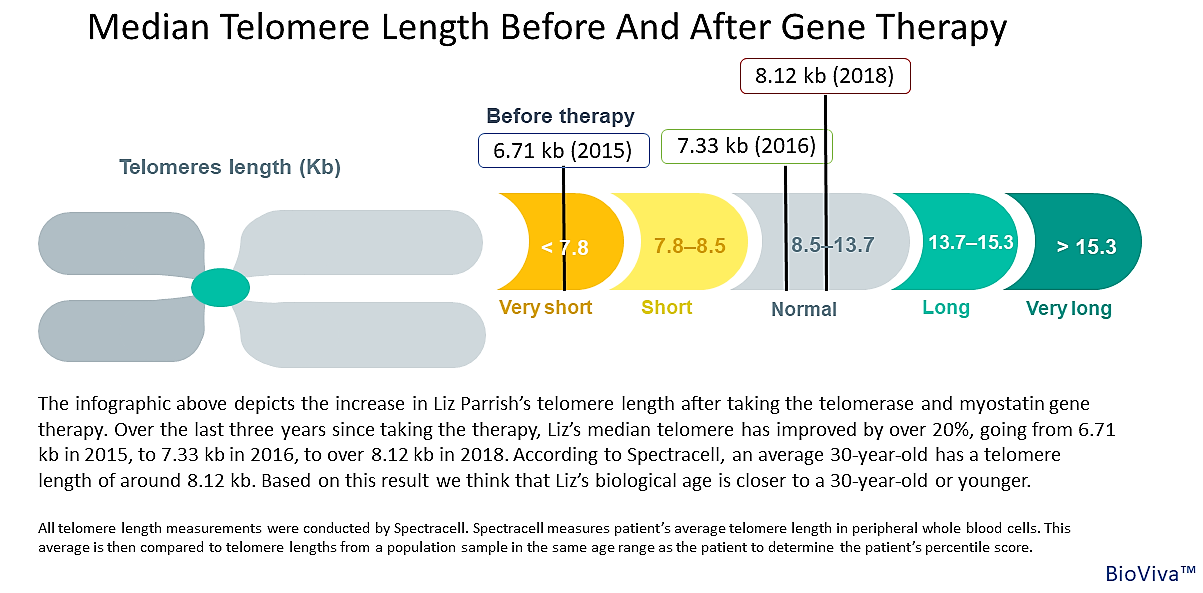People with low muscle strength are 50% more likely to die earlier, a new study:
People with weaker muscles have a 50 percent greater chance of dying earlier than their stronger peers after adjusting for other factors.



Researchers have demonstrated that telomerase gene therapy does not increase the risk of cancer, even in strains of mice that are particularly susceptible to cancer [1].
A tale of telomeres
Short telomeres trigger cellular senescence and are thought to be one of the primary hallmarks of aging, which has led to various researchers seeking ways to restore the telomeres in order to prevent cells from dying and to encourage division and tissue regeneration. We won’t go over the basics of telomeres and how they influence aging here, but if you would like to learn more, check out our telomeres article, which explains it all.

Our ultimate mission is to make 100 years old the new 60.”
A new exploration of stem cells from placentas could drastically advance regenerative medicine. Peter Diamandis, X-Prize and Singularity University founder, recently teamed up with Robert Hariri, the founder of Celgene Cellular Therapeutics, to study these specific stem cells in the hopes of discovering new regenerative therapies.
The initiative, called Celularity, is built around the idea that stem cells found in the human placenta (which transports nutrients to fetuses as they grow) are ideal for regenerating tissue and organs. According to Celularity, the cells can be taken from any placenta, which typically just gets discarded, and placed into any human without the risk of rejection.


The following is the third and last part of a short fictional story about a man realizing for the first time his deep desire to avoid aging and death. We published the first and second parts of the story on the last two Fridays, so check them out if you missed them.
Right after you wake up, there is a brief moment when you don’t yet know how you feel. That Sunday morning, that moment was even shorter than usual. The same anxiety as the previous night assailed me even before I could get out of bed.
The clock on the shelf said it was 11:30. I had slept almost 12 hours straight, but I wasn’t rested at all. Tired and depressed, I got up with difficulty, with a constant feeling of imminent catastrophe. I cast a glance out the window, and I noticed that the sky was clear and bright again. Upon closer inspection, I noticed the streets too were perfectly dry, as if it hadn’t rained for days. Indeed, the sun seemed to be very hot.


Today, we want to draw your attention to a recent study showing an association between the accumulation of Tau proteins, which are misfolded proteins that typically indicate Alzheimer’s disease and senescent cells.
Unfortunately, this journal paper is hidden behind a paywall, as is 70% of scientific data; this is an unacceptable situation for science and the sharing of knowledge. However, thanks to the work of Sci-Hub, a website that bypasses paywalls and offers free access to all scientific papers, you can read it without spending a dime.

Healthy diet linked to healthy aging and longer telomeres, a new study on 5000 healthy adults. Relationship significant in women. … All four diets emphasize eating plenty of fruits, vegetables, whole grains and plant-based protein and limiting consumption of sugar, sodium and red and processed meat. Overall, the findings suggest that following these guidelines is associated with longer telomere length and reduces the risk of major chronic disease…”
Eating a diet that is rich in fruits, vegetables and whole grains and low in added sugar, sodium and processed meats could help promote healthy cellular aging in women, according to a new study published in the American Journal of Epidemiology.
“The key takeaway is that following a healthy diet can help us maintain healthy cells and avoid certain chronic diseases,” said lead author Cindy Leung, assistant professor of nutritional sciences at the University of Michigan School of Public Health. “Emphasis should be placed on improving the overall quality of your diet rather than emphasizing individual foods or nutrients.”
In the study, researchers used telomere length to measure cellular aging.

A handy guide to logical fallacies for life extensionists.
When debating life extension, or debating in general, it may happen that participants commit logical fallacies—that is, their arguments contain logically invalid reasoning. In practice, this often means that people incorrectly come to certain conclusions that do not actually follow from the premises; if they appear to follow, it’s indeed because fallacious reasoning was used.
Logical fallacies can be tough to spot, both for the people committing them and for the people listening; rejuvenation advocates would therefore benefit from familiarizing with common fallacies committed during debates about life extension so that they will both be able to detect them in other people’s arguments and avoid committing any themselves.
The following is a list of common logical fallacies that usually show up during life extension debates. It may be useful for your advocacy efforts, but bear in mind that the right way to go about rebutting fallacious reasoning is not simply pointing out “You committed a fallacy; your argument is invalid”; in fact, you’d better avoid mentioning the word “fallacy” altogether. What you are likely to get this way is simply a lot of eye-rolling; your message will probably not get across, and you will come across as an insufferable pedant, even if you’re right. I’ve personally met people who don’t seem to think that a logical fallacy in their reasoning is such a big deal. Debating with such people is probably a waste of time, but in general, people might be more receptive if you politely explain why their reasoning doesn’t work, providing different examples and avoiding a lecturing attitude at all costs.